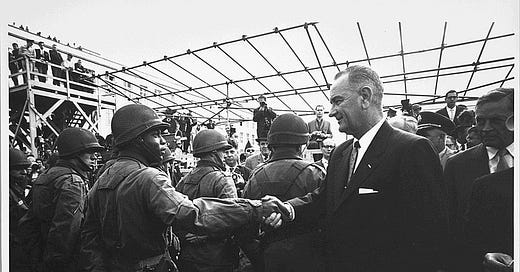As Moscow threatens the West, the president dispatches the Vice President Lyndon Baines Johnson to deliver a critical message. History rhymes…
Your favorite Veepologist is a bit behind, alas stymied by other commitments (work, teaching, family) and has not had time to write up his thoughts on Vance’s speech in Munich. It’s coming, and it’s different. A cold take, but a different one.
But in the meantime, for Throwback Thursday, here’s a post from April 2022 about Vice President Lyndon Johnson’s August 1961 trip to Berlin, shortly after the Berlin Wall was built. Johnson delivered a message of hope and reassurance to the nervous people of Berlin and Europe as a whole.
In the post below, I mostly rely on one source, but promise to visit Robert Caro’s unparallelled work on LBJ. Well I did. His entire discussion of the trip was a throwaway line:
On the weekend of August 18, Lyndon Johnson was in Berlin, as President Kennedy’s representative to assure that city of American support in a Russian-instigated crisis…
Johnson’s trip occurred while his mentor, House Speaker Sam Rayburn was dying. For Caro’s analysis of Johnson’s character the trip to Berlin was not particularly important. He doesn’t even bother to name the Russian-instigated crisis—the construction of the Berlin Wall. In The Best and the Brightest, Halberstam writes that Johnson didn’t want to go. LBJ saw himself being used on these trips by the President. For an analyst of the Cold War this incident might be a bit more significant. For a Veepologist, Johnson’s trip to Berlin is very interesting (as is most VP travel!)
At the Midwest Political Science association, there was a paper on JFK’s role in the passage of the Civil Rights Act. The speaker noted that LBJ, deservedly, gets a great deal of credit for its passage but that before his assassination JFK had done the spade work that made LBJ’s historic achievement possible. Your scholar of Veepology asked if LBJ had any role in advising and bolstering JFK’s commitment to civil rights. LBJ was renowned for his legislative acumen and was a southern Democrat who supported civil rights. The speaker had no answer and my research shows little evidence of it. Kennedy felt that giving LBJ a prominent role in legislative affairs would reduce Kennedy’s own stature, as Johnson had been Senate Majority Leader while Kennedy had been a rather junior member of the Senate. The main source was an excerpt published in The New York Times from Robert Dallek’s Flawed Giant: Lyndon Johnson and his Times, 1961-1973.
More research is needed (including delving into Robert Caro’s magisterial The Passage of Power: The Years of Lyndon Johnson, Vol. IV). Johnson was miserable as VP, having gone from one of the most powerful figures in Washington as Senate Majority Leader to political cipher as Vice President. Nonetheless, there were some intriguing items that require more investigation including Johnson’s work as head of the Committee on Equal Employment Opportunity (CEEO) and chair of the National Aeronautics and Space Council (there is little new under the sun…) The CEEO was an attempt to use executive power to combat discrimination by advancing equal opportunity and African-American hiring within the federal government and by federal contractors. It had modest success, but was no substitute for major legislation.
One particular item stuck out, highlighting the importance of Vice Presidential visits. In August 1961 the Soviets built the Berlin Wall to prevent the mass exodus of East Germans to the west. This was at the height of the Cold War. Building the wall left the people of West Berlin, an island of freedom surrounded by Soviet-backed Communist East Germany, threatened and isolated. It raised fears throughout the Western Europe of Soviet encroachment. To highlight American resolve and support for West Germany, Kennedy instructed Johnson to travel to Germany and West Berlin and deliver a message of support. Not as well remembered as Kennedy’s own visit to West Berlin in 1963, nonetheless Johnson was greeted by massive and enthusiastic crowds who were heartened by his declaration that:
…in the long run this unwise effort will fail…. This is a time, then, for confidence, for poise, and for faith–for faith in yourselves. It is also a time for faith in your allies, everywhere, throughout the world. This island does not stand alone.
The next morning, Johnson was on hand as 1500 U.S. troops arrived in Berlin. The president had ordered the troops deployed as a further show of American commitment arrived. The people of Berlin greeted them with cheers and flowers. The American commander compared the spirit to the liberation of Paris.

This newsletter focuses on the inside baseball of influence, but the public aspect of the vice presidency is powerful and can make a difference. Sometimes symbolism is the substance.




